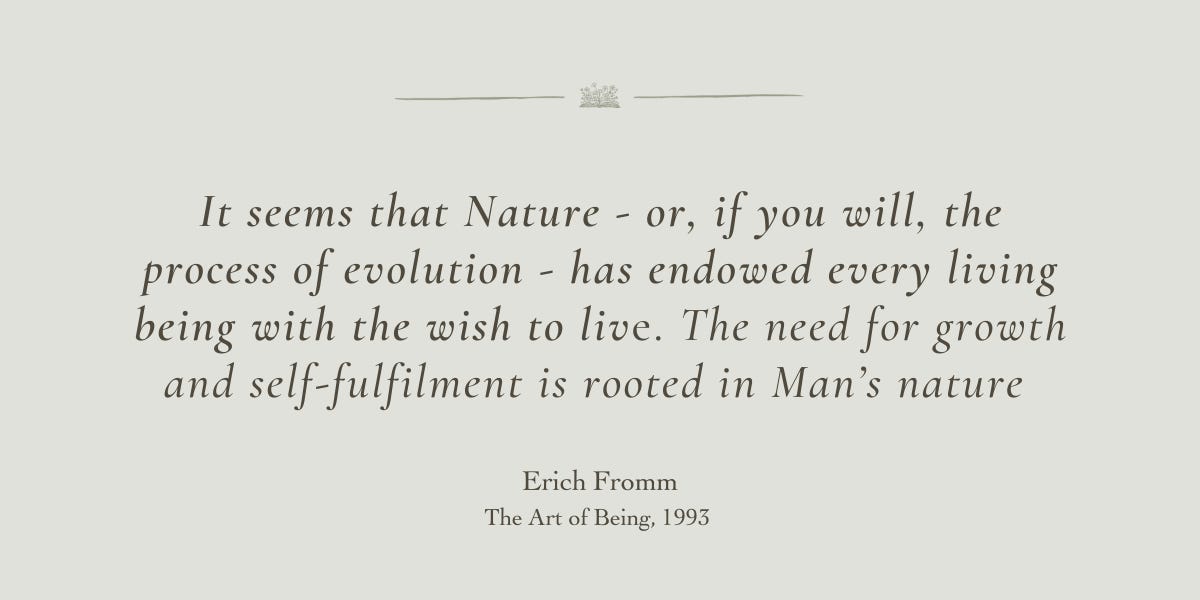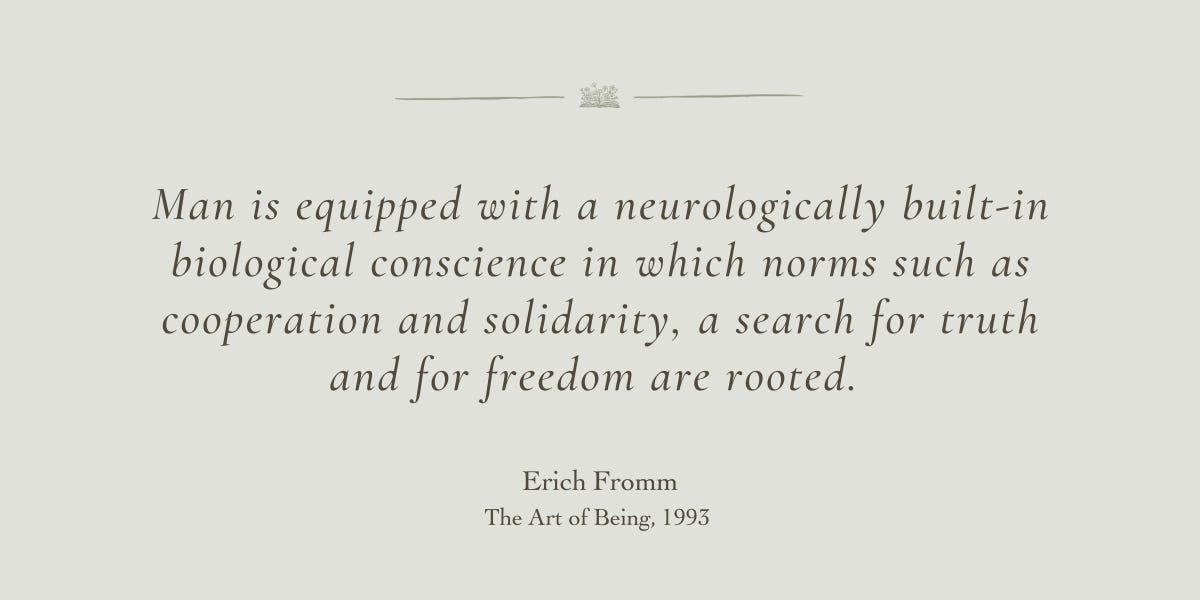The Art of Being by Erich Fromm
Understanding human needs and potential, living life and transforming how to be ourselves into an artform
Hi, I’m Sue and I write about the beauty and ingenuity of Nature, and how we can deepen our connection for our optimum health and wellbeing. Discover more Nature-inspired content on Spiral Leaf, Twitter and my video Nature Channel.
The Art of Being follows my post The Art of Loving which shares the wisdom of Erich Fromm as part of a series of seminal books examining the nature of culture, biophilia and conditions required to support the needs of human potentiality.
The Art of Being was written in a series of manuscripts while Erich was working on his book To Have or To Be which I will be writing about in due course.
This work focuses on ‘steps towards being’ and provides practical guidance on how to transition from the destructive ‘having’ mode of existence to the productive ‘being’ way of living.
This of course requires the creation of cultures that support our need for biophilia and our right to fulfil our human potentiality or, as Abraham Maslow called it, to self actualise as individuals. It is why every human environment on planet Earth should be designed to nurture people for the benefit of all.
Life is an artform
Erich’s premise for The Art of Being states that the full humanisation of man requires the break-through from the possession-centred to the activity-centred orientation, from selfishness and egotism to solidarity and altruism.
Erich explains his thinking on the Art of Being in the first part of the book and in the third and fourth, he gives practical suggestions concerning the steps that might be helplful as preprations for the effort to move toward humanisation as a ‘being’ mode of existence.
These include ideas around:
building a community
being awake
being aware
the power of concentration
the benefits of meditation
methods of self analysis
knowing what the culture of having means with its problems for the layman in terms of its philosophy and psychology
The Art of Being (or the Art of Living) is therefore a guidebook containing crucial information needed for us to transform being or living into an artform. It teaches us that we can learn the principles of self and master methods for living life freely as aware, responsible, loving, self-determining and self-actualising human beings.
False paths of awareness
When we orient ourselves and our lives toward the ‘having’ mode of existence, it means that our meaning for living becomes increasingly driven and determined by what we own, could own, have owned, will own, want to own or don’t want to lose.
Psychologically, Erich clearly signifies that this means (by definition), if we lose our things or our control over things, we lose our raison de vivre.
It seems to me that people living in the having mode of existence spend their days worrying about how to make money and their nights worrying about how they might lose it. It has become their central focus - an obsession in a world where competition is rife and literally anything goes to keep making and hoarding more things.
It is in fact a precarious game (and a trap) where making money comes first before anything and above anyone else. Anything good for us has been de-valued and we get sucked into the fake fantasy and broken promises of being led - as if there was no alternative, on their false path to awareness.
For us, it has been a necessary (albeint harsh and steep) path of enlightenment that we have all been negotiating these last few years. Erich Fromm puts it into order and provides the encouragement and tools we need to walk our own path and look to ourselves to create the life we want to live in happiness, sharing things, learning things, working together and realising our potential.
Erich Fromm’s work speaks of his genuine love for humanity and not the wayward Marxist he is proported to be. Such untruths deter us from digging a bit deeper and finding gems of fundamental truth that makes sense and can be used to help us today.
It’s not only the having and hoarding of property and posessions that cause anxiety for humanity. The same principle applies when people decide to take ownership - or have authority over - other people, wildlife and animals. [This is true, no human being can have authority over another, it is God’s Law under which the Law of the Land stands ruled by the people.]
The same applies to taking ownership through status symbols, qualifications or a so-called ‘good education’ that is designed to help you rise up the ladder - or not.
I would add that these things mean little or nothing to anyone interested in living a natural, holistic, humanistic life in harmony with Nature and their fellow humans. I wrote about this in my previous post - Why Biophilia and Humanistic Potentiality?
As Erich states: That we want to live, that we like to live, are facts that require no explanation. What matters is to examine what happiness means - for the layman.
Understanding human needs
Most human needs today are defined subjectively. In the ‘being’ mode of existence human potentiality and wellbeing come first, in the ‘having’ mode of existence, material and psychological needs come first.
Transitioning from a ‘having’ to a ‘being’ way of living means asking some direct questions about our morality and what our real needs are. Try asking the following questions to see what you come up with.
Are my needs rooted in my social standing and cultural desires rather than the wellbeing of my whole self and those around me?
What effect does the satisfaction of my needs have on the wellbeing of my own self and that of others?
Are my current needs and desires conducive to my healthy growth and general wellbeing, are they helping me to realise my humanistic potentiality?
Losing life
Erich states that the goal of life was lost in the industrial society and was manipulated further in the technical and digital ages. Liberation has been exclusively applied by outside forces - by the middle class from feudalism; by the working class from capitalism; and by the peoples of Africa and Asia from imperialism. This amounting to political liberalism which has led us to the extremes of the ‘having’ system that causes so much harm to this day.
We know well enough about the great shams that Erich explains in the second part of the book with details and accurate preductions in terms of their line of trajectory from then until now. I am not covering this here in order to focus on the good stuff that we can learn from and feel inspired by.
Living life
Suffice to say, we are where we are now because of the man-made ‘having’ system. What really matters now is to turn our attention towards our preferred vision for life to live as human beings and to flourish together on this beautifu planet Earth as intended.
It means severing our ties with the broken system of empty promises and fear-mongering. It means letting go and learning how to put the fun back into life as we co-create our new world and master the Art of Being.
From having to wellbeing
Friends here recognise attributes that align with our shared core values to love thy neighbour as thy self as explored in The Art of Loving.
Erich closes the final chapter - From Having to Wellbeing - with a plea to break through one’s narcissism and break through the property structure of one’s existence.
He concludes: At a certain point the energy and direction of inner forces have changed to the point where an individual’s sense of identity has changed too. In the property mode of existance the motto is: I am what I have’. After the breakthrough it is: ‘I am what I do’ (in the sense of unalienated activity); or simply, ‘I am what I am’.
Thank you for reading and I wish you a beautiful day being you!
Further Reading
The theory and practice of mastering unconditional love for ourselves and for humanity as a whole
BUY THE BOOK!
The Art of Being by Erich Fromm
If you click on the above link you can purchase this fascinating (and highly practical) book from my affiliate bookshop. All books are sold by independent sellers and bookshops. Spiral Leaf may earn a small commission on purchases with no extra cost to you!
Thank you for reading, I hope it was helpful and I look forward to seeing you again soon.














Excellent understanding of the different modes of living and seeing. The person who sees having as the way to live involves endless scheming and striving in competition with other humans and an alienation from Nature. This is our consumer culture.
The person who sees being as the way to live cares not about possessions, competing and wants to be One with Nature. I sense that there are people here on the Substack community who see the former as life-draining and the latter as life-affirming. This is our real human selves.
Oh wow! This is fantastic. Thanks for sharing!